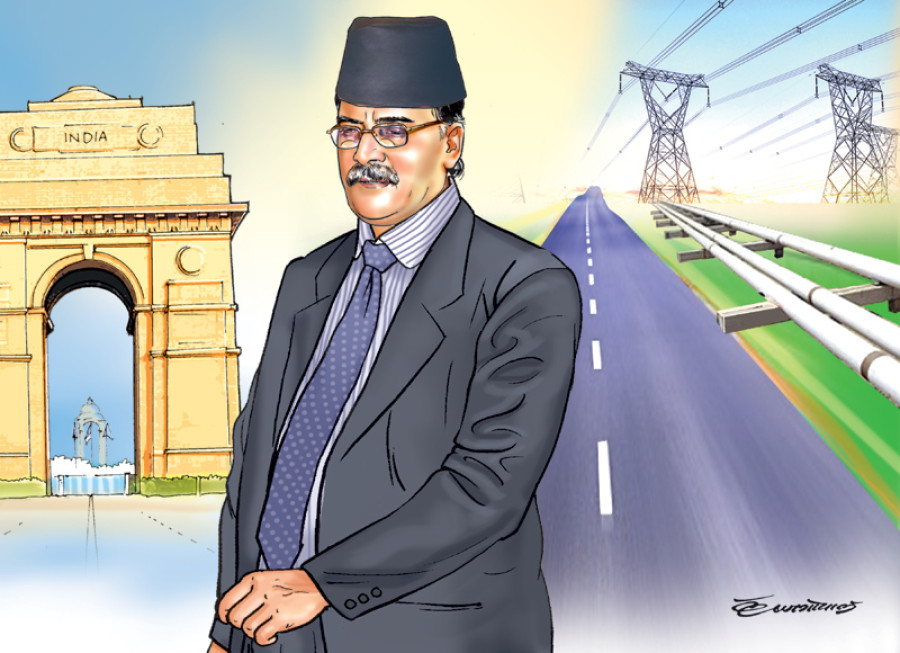Opinion
Not your usual visit
This time around Nepal will also discuss what it can contribute to regional stability
Binayak Basnyat
The Dahal administration faces historic challenges which can reposition Nepal in the region and the world. One such challenge is how the Nepali delegation will compose the country’s diplomatic stance alongside their counterparts in New Delhi during their four-day visit which started yesterday. Deputy Prime Ministers Mahara and Nidhi were sent to India and China respectively to lay the ground for top-level political visits to and from the two neighbours on August 12, only eight days after assuming office. Upon their return, Indian President Mukherjee agreed to visit Nepal; his trip has been confirmed to begin on November 3. Likewise, Chinese President Xi is most likely to visit Nepal in October.
Earlier this week, the prime minister informed the parliamentary International Relations Committee that he saw the neighbourhood challenge as an opportunity and is positive about how his administration will deal with the issues at hand. Speaking at the Nepal Institute of International Relations on September 10, the prime minister said that Nepal’s peace, stability, development and national independence could be possible only through a tripartite strategic partnership between Nepal and her two neighbours. This is the prime minister’s first foreign visit after assuming office in August, and the limited time available to the Nepali delegation to discuss major issues calls for professional swiftness in both addressing and responding to the issues on the table.
Constitutional amendment
Amending Nepal’s constitution will certainly be one of the major items on the agenda.The Indian government desires peace and stability in Nepal, particularly along its southern border, and long-term security in the region. Towards this end, India would like the Dahal administration to pave the way for seven amendments to the constitution. Addressing the nation on September 8, the prime minister said that his administration was ready to introduce the necessary laws to amend the constitution. The issues related to the proposed amendment to the constitution are the following.
Article 63 (3) of the Interim Constitution states that the electoral constituencies will be based on population, geography and special characteristics, “and in the case of Madhes on the basis of percentage of population.” The last point has been omitted from Article 84 of the new constitution which India wants reinserted. Article 21 of the Interim Constitution says that various groups will have “the right to participate in state structures on the basis of principles of proportional inclusion”. The word ‘proportional’ has been dropped from the new constitution which India wants put back. Another amendment concerns special provisions relating to the citizenship of the office-bearers in Article 283.
Likewise, India wants representation in the National Assembly to be based on the population of the provinces. But Article 86 of the new constitution states that it will comprise eight members from each of the seven states and three nominated members. India also wants Jhapa, Morang, Sunsari districts, which have been included in Province 1, and Kanchanpur and Kailali, which have been made part of Province 6, included in the Madhes provinces. Article 281 (12) states that the delineation of electoral constituencies shall be put to a review every 20 years. India wants this period to be halved to 10 years as in the Interim Constitution. Article 11 (6) states that a foreign woman married to a Nepali citizen may acquire naturalised citizenship as provided under federal law. The Madhesi parties want naturalised citizenship to be granted automatically on application.
Eminent Persons Group
After a successful first round of meetings in Nepal, the matter of strengthening the capacity of the Eminent Persons Group (EPG) and understanding its limitations will be another major topic of discussion between the two sides during the visit. Most Nepalis believe that the Peace and Friendship Treaty of 1950, which was signed during the Rana rule, undermines public interest and does not justify circumstantial changes. To address this matter, Nepal and India agreed to form the EPG in 2014. It’s first meeting held in July agreed to update the treaty to make it relevant to the present context.
One of the issues is about regulating the open Nepal-India border. After the 2015-16 unofficial blockade, Nepal proposed restricting free travel and India too wanted to fence off insecurity and anti-Indian activities from Nepal. However, the short- and long-term impacts of this move may be beyond what we normally anticipate. Bhekh Bahadur Thapa, former foreign minister and a member of the EPG, pointed out that though Nepal has a right to abrogate the treaty, doing so may actually produce new challenges for both countries. Therefore, while Nepal and India have agreed on a common agenda to review the 1950 treaty, the EPG’s way forward is a matter that both sides need to address properly in New Delhi this week.
Just as in human relationships, an emphasis on receiving or taking from others, as opposed to offering and giving to them, causes stress. The success of Nepal’s bilateral and multilateral ties has usually been measured in terms of what and how much it has got from other countries rather than what it can give. This practice is most likely to change during the prime minister’s India visit. Foreign Minister Mahat has clearly pointed out that Nepal will not risk its professional prestige over petty gains. Rather, the Nepali delegation, besides addressing the issues mentioned above, is also likely to address a number of other issues through which Nepal will be contributing to regional stability.
Basnyat holds a Master’s in Diplomacy and International Studies from Rangsit University, Thailand




 17.9°C Kathmandu
17.9°C Kathmandu











